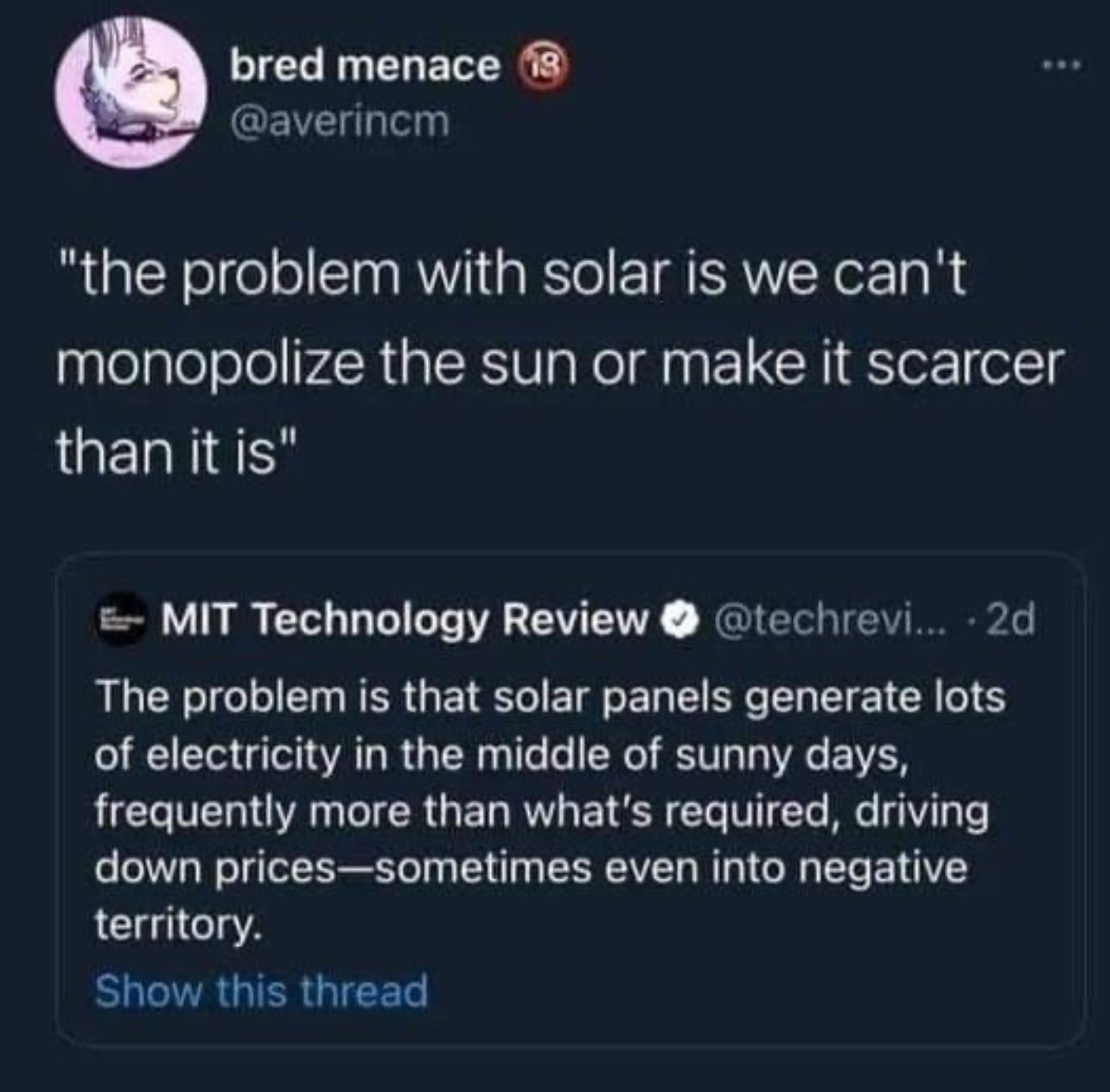Nonsense. Just build a Dyson sphere around it and be the sole owner of the entire star's energy.
Microblog Memes
A place to share screenshots of Microblog posts, whether from Mastodon, tumblr, ~~Twitter~~ X, KBin, Threads or elsewhere.
Created as an evolution of White People Twitter and other tweet-capture subreddits.
Rules:
- Please put at least one word relevant to the post in the post title.
- Be nice.
- No advertising, brand promotion or guerilla marketing.
- Posters are encouraged to link to the toot or tweet etc in the description of posts.
Related communities:
Every time someone mentions "oh no solar is producing too much energy" I think of this deranged Forbes article from a few years back.

alt-text
Microsofts billionaire founder Bill Gates is financially backing the development of sun dimming technology that would potentially......{blahblah global cooling}
of course it's a furry shitposting about it.
They aren't wrong though, storage technology is only starting to come to market in significant enough capacity to be beneficial.
And for storage plants to be financially viable energy costs during the day need to be really cheap, so they can raise them at night and make a significant enough profit to break even.
Solar generation is kinda saving our asses here in Ukraine though, and was even more in the summer. So I guess all you need for solar to be viable is to have most of your other power sources to get bombed
Call me stupid, but why don't they just charge enough to cover costs and a bit of profit? The current pricing model is broken if you can't run a solar plant profitably.
It is all quite complicated.
-
A renewable producer (e.g. solar panels) cannot produce energy 24/7. And when it produces energy, you are not guaranteed the production is stable.
-
A consumer cannot consume energy 24/7. And when they consume energy, you are not guaranteed the consumption is stable.
-
To make the issue worse, a producer may not be producing energy when the consumer wants it, and vice versa.
-
Currently, energy storage is not widely installed. Hence any produced energy must be consumed at the same time.
The factors above combined means that there will be a mismatch. If the production is too great, your electricity appliances will probably explode and whatnot. If the consumption is too great, you experience blackouts. Neither are desirable.
Now consider there is a middleman. The grid. Producers sell energy to the grid. Consumers buy energy from the grid.
At some point in time, due to the factors above, the grid will need (A) zero to negative prices to encourage consumers to buy & use more energy from it, and to encourage producers to produce & sell less energy to it. Or (B) increased prices to encourage consumers to buy & use less energy and producers to produce & sell more energy. A flat price is not realistic. (Residential users only have a flat rate because our demand patterns are more stable.)
But due to the production patterns of renewable energy and consumption patterns of our society, there is a not-insignificant risk that renewable producers will consistently face scenario (A) above making it difficult to cover back the costs.
why don't they just charge enough
Because who would pay 10 cents per kilowatt hour when there's someone else who will pay someone to take that energy off their hands?
The problem is caused when the market clearing price is lower than the cost it took to produce it, and some of those costs are in the past.
It's like getting a boat and going fishing. If you pay $10,000 for the cost of the trip, and bring back $8,000 worth of fish, you can't just force people buy them from you for a 25% markup.
Yeah yeah down with capitalism rah rah but if the electric company makes no money, how do they afford infrastructure maintenance?
Ok so we nationalize the electric company. Now taxes pay to keep up the electric grid?
I'm down for all of that, by the way. It's a great solution. But there is absolutely, indisputably, 100% a problem here, and it's childish to pretend that if evil corporations would stop being so greedy everything would magically fix itself. It's completely valid to discuss this issue in terms of problems and solutions.
That's not at all what MIT is talking about here. This goes into detail around the challenges tied in rolling out grid scale solar in a way that aligns with supply and demand curves, and how to make sure we're able to capture overproduction so that we can use it when not enough is being produced. It's a complex shift to work out in our over 100+ year grid production structure, and has been an ongoing discussion across the energy sector. But you know...memes and shit.
